| | | OFFLINE | | Post: 22.079
Post: 4.707 | Registrato il: 28/08/2005
Registrato il: 20/01/2009 | Administratore | Utente Master | |
|

 Pope Benedict XVI ordains
Pope Benedict XVI ordains
five new Curial archbishops
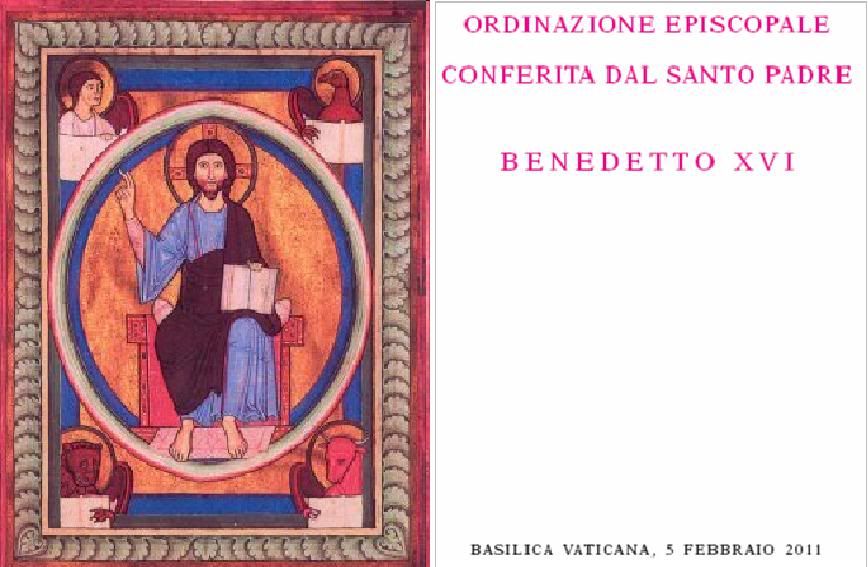
At 10 a.m. today, the Holy Father presided at Holy Mass during which he ordained four prelates as archbishops. Concelebrating were Cardinal Angelo Sodano, dean of the College of Cardinals; Cardinal Secretary of State Tarcisio Bertone, and the five bishop-ordinands.
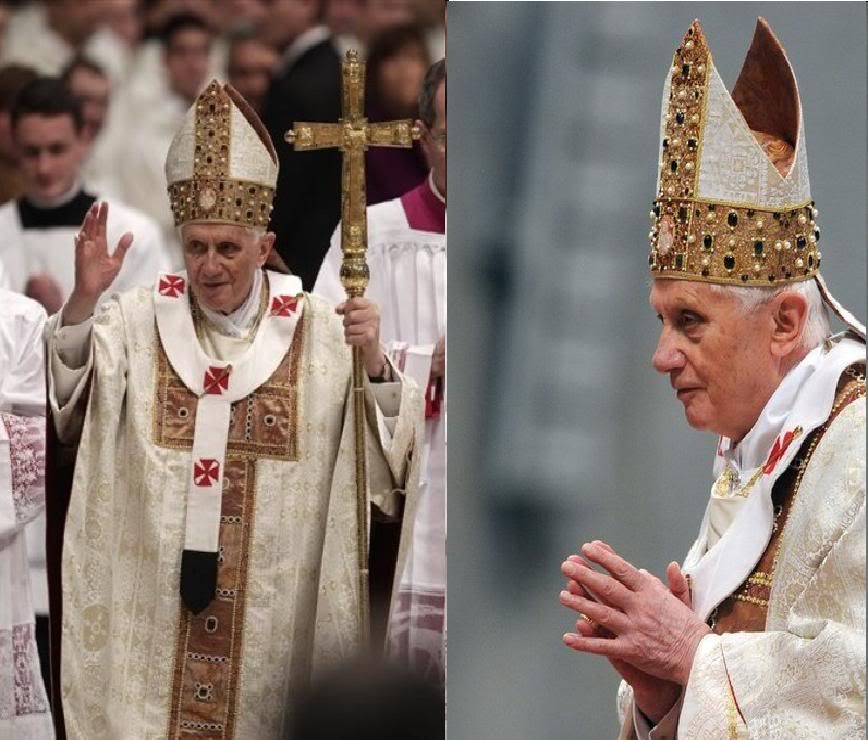
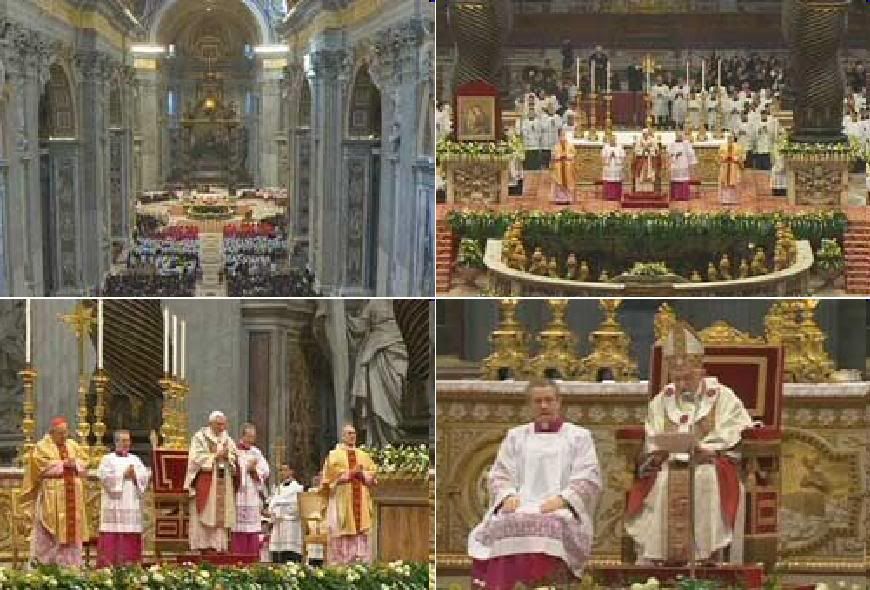
5 FEB 2011 (RV) - Pope Benedict XVI ordained 5 new bishops with the rank of Archbishop on Saturday during Mass in St Peter’s Basilica:
- Mons. Savio Hon Tai-Fai, Secretary to the Congregation for the Evangelization of Peoples
- Mons. Marcello Bartolucci, Secretary to the Congregation for the Causes of Saints
- Mons. Celso Morga Iruzubieta Secretary to the Congregation for Clergy,
- Mons. Edgar Pena Parra, Apostolic Nuncio to Pakistan, and
- Mons. Antonio Guido Filipazzi, awaiting assignment as an Apostolic Nuncio.
In his homily, the Holy Father spoke of the role of the bishop as pastor of souls and living witness to the faith of the Church, for the protection and conservation of which his office was instituted by Christ, and has come down to the present day in an unbroken chain from Peter and the Apostles.
The Holy Father also spoke of the urgent need for men to do the work of the Lord: “ ‘The harvest is plentiful’ - even today, right now,” said Pope Benedict, quoting from the Gospel according to St. Luke, which was read at Mass.
The Pope went on to say, “Although it may seem that large parts of the modern world, men of today, turn away from God and maintain that faith is a thing of the past – even so, there is a deep, groaning desire that justice, love, peace, be finally established, that poverty and suffering are overcome, that people find joy.”
“All this yearning,” he said, “is present in today's world, the yearning for that, which is great, for all that is good. It is nostalgia for the Redeemer, for God himself, even where He is denied.”
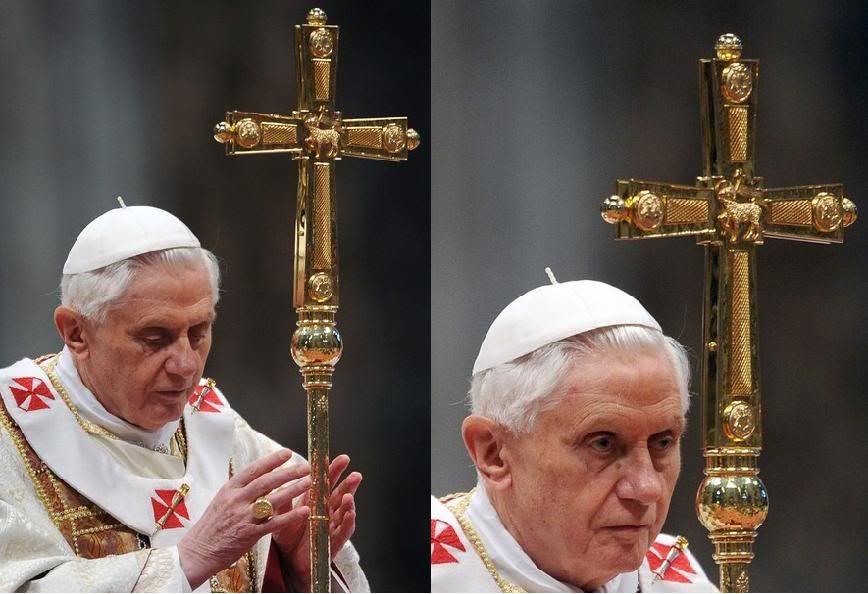
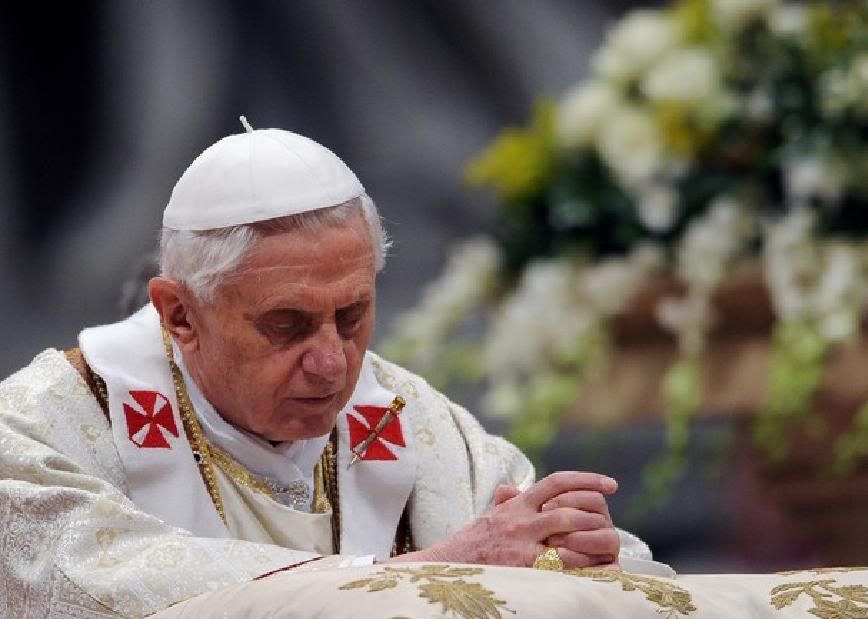 Here is a full translation of the Holy Father's homily:
Here is a full translation of the Holy Father's homily:
Dear brothers and sisters:
I affectionately greet our five brother priests who will shortly receive episcopal ordination: Mons. Savio Hon Tai-Fai, Mons. Marcello Bartolucci, Mons. Celso Morga Iruzubieta, Mons. Antonio Guido Filipazzi and Mons. Edgar Peña Parra.
I wish to express to them my gratitude and that of the Church for the service that they have rendered till now with generosity and dedication, and ask you to accompany them with prayers in the ministry to which they have been called, in the Roman Curia and in Pontifical Representation, as Successors of the Apostles, that they may always be enlightened and guided by the Holy Spirit in the harvest of the Lord.
"The harvest is abundant but the laborers are few; so ask the master of the harvest to send out laborers for his harvest" (Lk 10,2). These words from the Gospel in today's Mass touches us particularly close at this time. It is a time of mission: The Lord sends you, dear friends, to his harvest. You must cooperate in that responsibility which the prophet Isaiah speaks of in the first Reading: "The Lord has sent me to bring glad tidings to the lowly, to heal the brokenhearted" (Is 61,1).
This is the work of harvesting in the field of the Lord, in the field of human history: To bring to men the light of the truth, liberate him from his poverty in truth, which is the real sadness and the real poverty of man.
To bring to them the happy news that is not merely words, but an event: God himself has come among us. He takes us by the hand, he draws us upwards, towards him, and so the broken heart is healed.
Let us thank the Lord because he sends workers to the harvest in the history of the world. Let us thank him because he sends you, because you said Yes, and because at this time, you will once again pronounce that Yes to being workers of the Lord for mankind.
"The harvest is abundant", even now, especially now. Even if it may seem that large parts of the modern world, of men today, turn their back to God and consider faith a thing of the past, the yearning still exists that finally, justice, love and peace may be established, that poverty and suffering may be overcome, that man may find joy.
All this yearning is present in the world today, a yearning towards what is great, what is good. It is nostalgia for the Redeemer, for God himself, even where he is denied. Precisely at this time, the work in the field of the Lord is particularly urgent, and precisely at this time, we feel in a particularly sorrowful way the truth of Jesus's words: "The workers are few".
At the same time, the Lord makes us understand that it it is not for us, by ourselves, to send laborers to his harvest; that it is not a question of 'management' [he uses the English word], of our organizational capacity.
Only God himself can send workers for the harvest in his field. But he wants to send them through the door of our prayer. We can cooperate for the coming of these workers, but we can do so only by cooperating with God.
Thus this time of thanksgiving for being able to send out a mission is, in a special way, also a time of prayer: Lord, send workers to your harvest! Open hearts to your call! Let not out pleading be in vain!
Today's liturgy thus gives us two definitions of your mission as bishops, as priests of Jesus Christ: to be workers in the harvest of the world's history, with the task of healing by opening the doors of the world to the lordship of God, so that the will of God may be done on earth as it is in heaven.
Then, our ministry is also described as cooperation in the mission of Jesus Christ, as a participation in the gift of the Holy Spirit, given to him as the Messiah, the Son anointed by God.
The Letter to the Hebrews - the second Reading - completes this idea with the image of the high priest Melchisedek, which is a mysterious reference to Christ, the true High Priest, King of peace and justice.
But I would also like to say something on how this great task is to be carried out in practice - about what is demanded concretely of us. For the Week of Prayer for Christian Unity, the Christian communities of Jerusalem chose this year the words from the Acts of the Apostles, in which St. Luke wished to illustrate normatively the fundamental elements of Christian living in the communion of the Church of Jesus Christ.
And he expressed it this way: "They devoted themselves to the teaching of the apostles and to the communal life, to the breaking of the bread and to the prayers" Acts 2,42).
These four fundamental elements of the essence of the Church also describe the essential task of her pastors. All the four elements are held together by the expression "They devoted themselves..." - erant perseverantes - which is how the Latin Bible translates it from the Greek: Perseverance, assiduity, belong to the essence of being Christian, and are fundamental for the task of Pastors, of workers in the harvest of the Lord.
The pastor should not be a reed that bends as the wind blows, a servant to the spirit of the time. To be intrepid, to have the courage to oppose the currents of the moment, this is essential to a Pastor's task.
He should not be a marsh reed, but, to use the image of the first psalm - he must be like a tree that has deep roots with which it stays firmly planted. This has nothing to do with rigidity and inflexibility. But only where there is stability can there be growth as well.
Cardinal Newman, whose path was marked by three conversions, said that to live is to transform oneself. But his three conversions and the transformations that occurred in each were nonetheless a single consistent way: the way of obedience, towards the truth, towards God - the path of true continuity which allows progress.
"They devoted themselves to the teaching of the Apostles": Faith has a concrete content. It is not an indeterminate spirituality, an indefinable sensation if the transcendent. God has acted and he himself has spoken. He truly did something and he really said something.
Of course, faith is, in the first place, trusting in God, a living relationship with him. But the God in whom we trust has a face, and he has given us his word. We can count on the firmness of his word.
The ancient Church summarized the essential nucleus of the Apostles' teaching in the so-called Regula fidei which, in substance, is identical to Professions of Faith. This is the trustworthy foundation on which we Christians depend on, even today.
It is the secure base on which we can construct the house of our faith, of our life (cfr. Mt 7, 24ss). Once again, the stability and definitiveness of what we believe do not mean rigidity.
St. John of the Cross compared the world of faith to a a mine in which we keep discovering new treasures - treasures within which the one faith develops, our profession of the God who manifests himself in Christ.
As pastors of the Church, we live in this faith, and so we announce it as the joyous message which makes us sure of God's love, that we are loved by him.
The second pillar of ecclesial existence is called communio by St. Luke. After the Second Vatican Council, this term has become a central word in theology and in proclaiming the Gospel, because it expresses, in fact, all the dimensions of Christian being and ecclesial life.
We do not know what Luke wanted to express with this word in this text. But we can calmly understand it in the global context of the New Testament and of apostolic Tradition.
One first major definition of 'communio' was given by St. John at the start of his First Letter: What we have seen and heard, what our hands have touched, we now proclaim to you so that you too may have 'communio' with us. And our 'communio is communion with the Father and with his Son, Jesus Christ (cfr. 1 Gv 1, 1-4).
God made himself visible and tangible for us, and thus has created a real communion with him. We enter this communion through believing and living together with those who touched him. With them and through them, we ourselves also see him, in a way, and we touch the God who made himself near to us.
Thus the horizontal and vertical dimensions are here inseparably woven together. By remaining in communion with the Apostles, by remaining in their faith, we ourselves are in touch with the living God.
Dear friends, that is the aim of the bishop's ministry: that this chain of communion may not be interrupted. This is the essence of the apostolic succession: to conserve communion with those who met the Lord in visible and tangible form, and thus hold heaven open through the presence of God among us.
Only through communion with the Successors of the Apostles are we too in contact with the incarnate God. And vice-versa: Only thanks to communion with God, only thanks to communion with Jesus Christ, does this chain of witnesses remain united.
We are never bishops by ourselves, Vatican-II tells us, but always and only in the college of bishops. And this cannot enclose itself in the time of its own generation. Woven together in this collegiality is the fabric of all generations, the living church of all times.
You dear brothers, have the mission to preserve this Catholic communion. You know that the Lord charged St. Peter and his successors to be the center of this communion, as guarantees of remaining within the totality of the apostolic succession and its faith.
Offer your help so that the joy at the great unity of the Church may remain alive, joy for the communion of all places and times, for the communion of faith that embraces heaven and earth.
Live this communion, and live with the heart, day by day, its deepest center in that sacred moment when the Lord gives himself to us in holy Communion.
And so we come to the next fundamental element of ecclesial existence mentioned by St. Luke: they broke bread. The evangelist at this point looks back at the disciples of Emmaus who recognized the Lord by his gesture in breaking bread. And from there, farther backwards in time to the Last Supper, during which Jesus, in breaking the bread, distributed himself - he made himself bread for us in anticipation of his death and resurrection.
To break bread: The Holy Eucharist is the center of the Church and should be the center of our Christian being and of our priestly life. The Lord gives himself to us.
The Risen One enters into my intimacy and wishes to transform me to make me enter into profound communion with him. And so he opens me up to everyone else: we, the many - we are one bread and one body, says St. Paul (cfr. 1 Cor 10, 17).
Let us seek to celebrate the Eucharist with a dedication, a fervor that is ever more profound. Let us seek to plan our days to its measure, let us seek to have ourselves formed by it.
To break bread: This also expresses sharing, transmitting our love to others. The social dimension - sharing - is not a moral appendix to the Eucharist but part of it. This is most clear from the verse from Acts that follows what we cited earlier: "All who believed were together and had all things in common" [(2,44).
Let us note that faith is always expressed in love and in justice towards one another, and that our social praxis must be inspired by faith, and the faith must be lived in love.
As the last pillar of ecclesial life, Luke mentions prayers. He uses the plural 'prayers'. What could this mean? Probably he was thinking of the participation of the first Christian community in Jerusalem in the prayers in the Temple, in the common order of prayer.
But this is how he highlights an important thing. Prayer, on one hand, must be very personal, uniting myself in the profoundest way to God. It should be my struggle with him, my search for him, my thanks to him, and my joy in him.
Nonetheless, it is also never just a private matter for my individual 'I' that does not concern others. To pray is essentially always a praying for 'us' by the children of God. It is only in this 'we' that we are children of our Father, as our Lord taught us to pray. Only this 'we' opens our access to God.
On the one hand, our prayer should always become more personal, it must touch and penetrate more profoundly the nucleus of our 'I'. On the other hand, it must always nourish itself from the communion of all those who pray - the unity of the Body of Christ, in order to truly shape me in the love of God.
And so, prayer, ultimately, is not just one activity among others, a certain part of my time. Praying is a response to the imperative that is at the start of the Canon in the Eucharistic celebration: Sursum corda - Let us lift up our hearts.
It is the ascent of my existence towards God's elevation. St. Gregory the Great had a statement about this. He recalls that Jesus called John the Baptist 'a burning and shining lamp' (Jn 5,35), and continues" "...ardent for his desire of heaven, resplendent with his words. Therefore, in order that the veracity of the announcement may be conserved, the elevation of life must be conserved" (Hom. in Ez. 1, 11, 7 CCL 142, 134).
Elevation, the high standard for life, which today is so essential in order to bear witness to Christ, is something we can only find if, in prayer, we allow ourselves to be drawn continually towards his highness.
Duc in altum - Put out into the deep! (Lk 5,4): Go towards the deep water and cast your nets for fish. This is what Jesus said to Peter and his companions when he called them to be 'fishers of men'.
Duc in altum: Pope John Paul II, in his last years, took up these words forcefully and proclaimed it aloud to the Lord's disciples of today.
Duc in altum, the Lord tells you today, dear friends. You have been called to responsibilities that concern the universal Church. You are called to cast the net of the Gospel into the agitated seas of our time in order to obtain the adherence of men to Christ: to draw them out, so to speak, from the saltwaters of death and from the darkness which the light of heaven cannot penetrate. You must bring them to the land of life, in communion with Jesus Christ.
In a passage of the first book of his work on the Most Holy Trinity, St. Hilary of Poitiers suddenly bursts into prayer: "That you may put wind into the sails of our faith and our profession of it with the breath of your Spirit and impel me forward as I travel with my message" (I 37 CCL 62, 35s).
Yes, let us now pray for you, dear friends. Unfurl the sails of your spirit, the sails of faith, of hope, of love, so that the Holy Spirit may fill them up and grant you a blessed voyage as fisher of men in the ocean of our time. Amen.
My goodness! One would never have suspected that this homily was so beautiful, brilliant and poetic, if one had only read the news reports about it. It confirms yet again that one must always read Benedict XVI in full. He cannot be reduced to random or poorly chosen excerpts and/or pitiful soundbites (since he does not think in soundbites)...
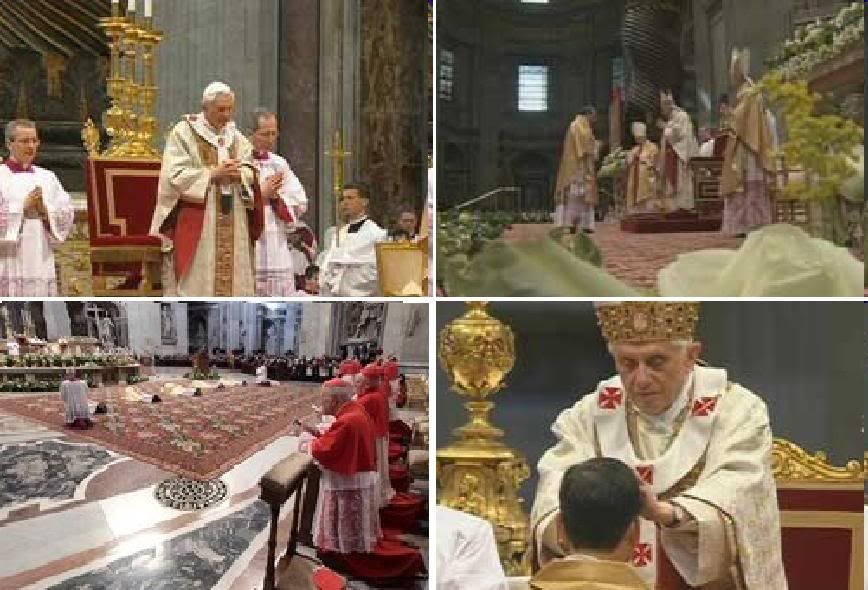
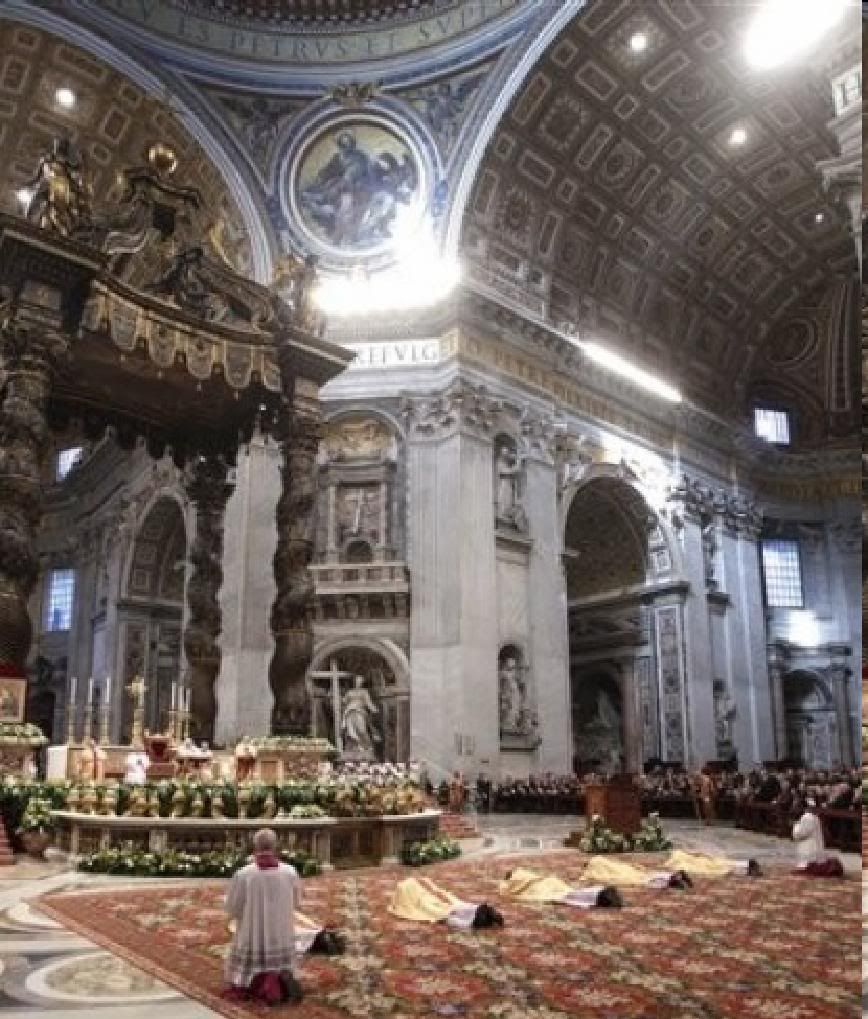 Benedict XVI cites apostolic succession
Benedict XVI cites apostolic succession
as the principle behind papal
prerogative to name bishops
by NICOLE WINFIELD

VATICAN CITY, Feb. 6 (AP) – Pope Benedict XVI has insisted on his exclusive right to ordain bishops as he consecrated a Chinese prelate, in an implicit challenge to attempts by China's official church to ordain bishops without his approval.
Monsignor Savio Hon Tai-Fai, a 60-year-old Salesian prelate from Hong Kong, was one of five bishops ordained by Benedict in St. Peter's Basilica on Saturday.
His elevation comes amid a new low point in relations between the Holy See and Beijing over the Chinese state-backed church's ordination of bishops without papal consent.
Benedict didn't refer specifically to China in his homily but insisted in general on the need for the Pope to name bishops to ensure apostolic succession.
Hon was recently named No. 2 in the Vatican's missionary office [the Congregation for the Evangelization of Peoples].
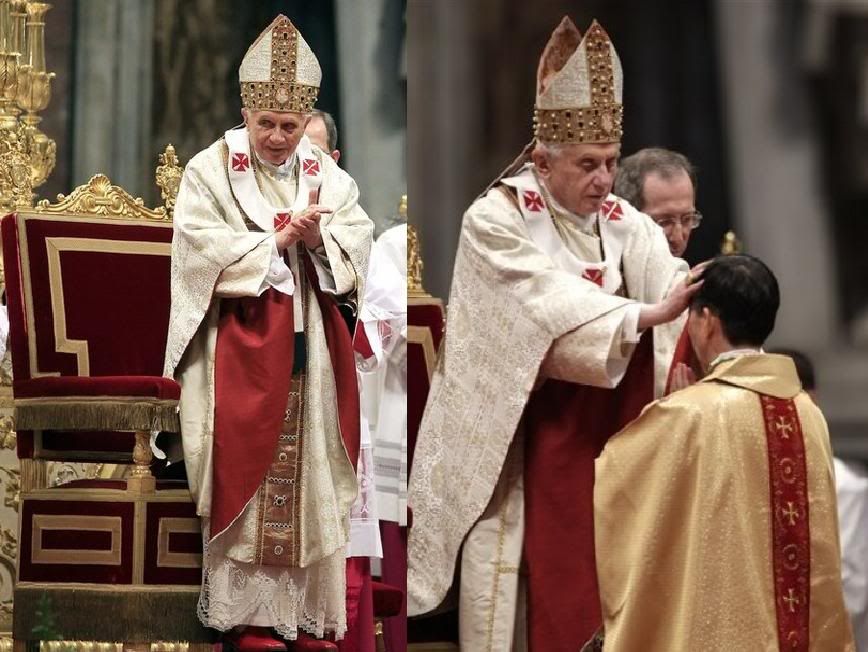 Above, the Pope lays hands on Mons. Hon.
Above, the Pope lays hands on Mons. Hon.
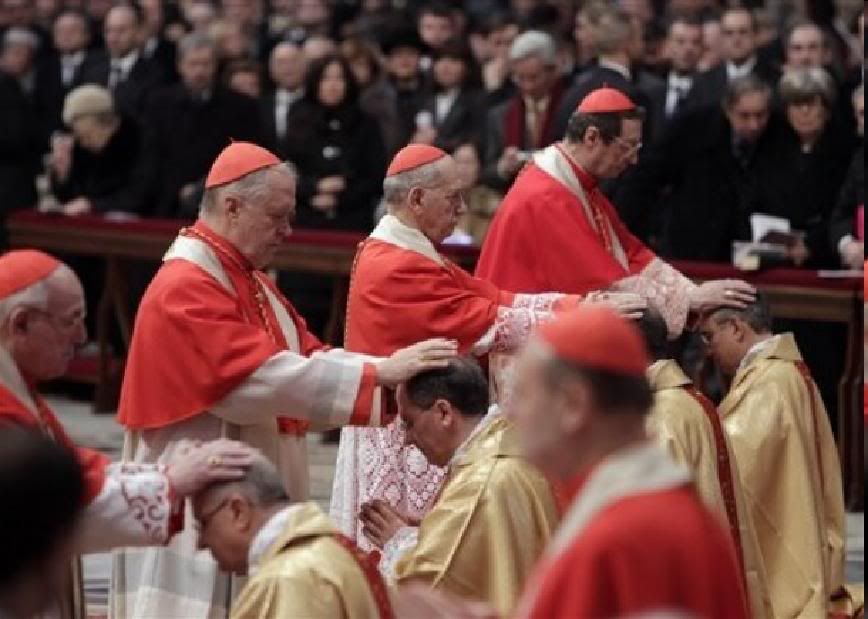
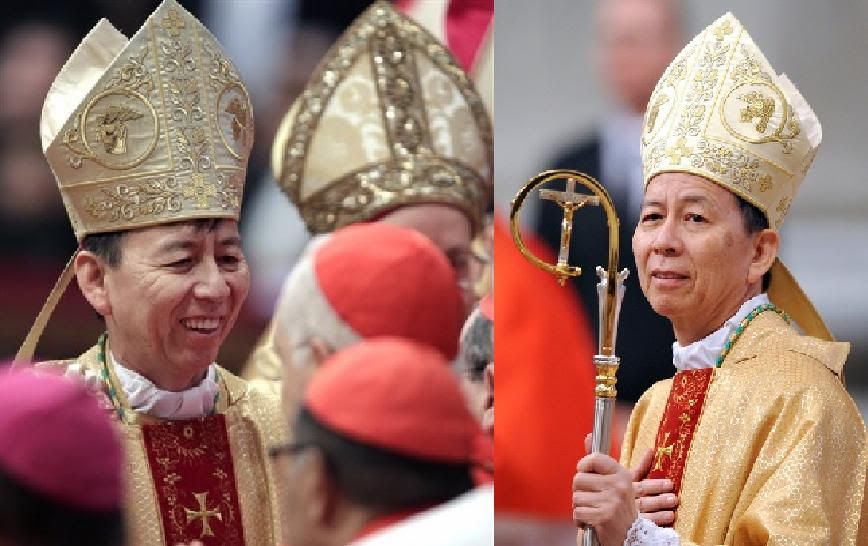
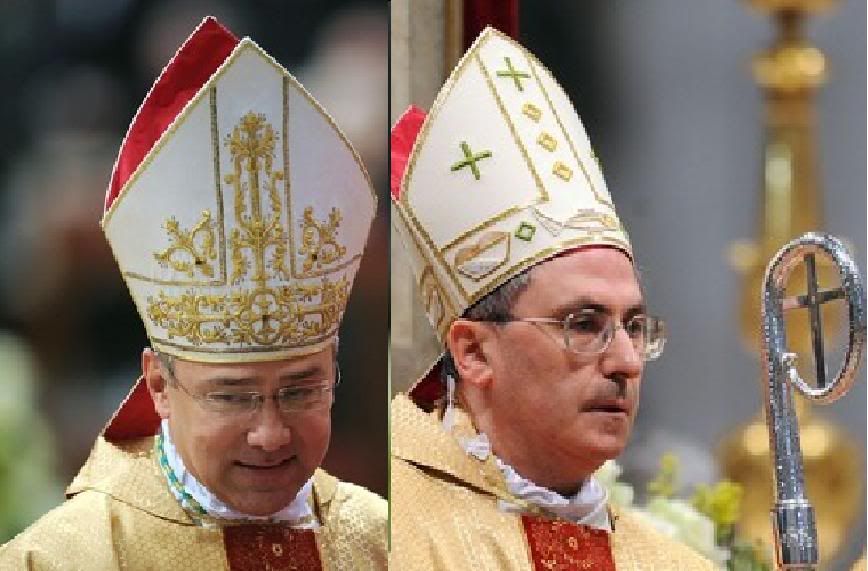 Above, Mons. Parra (left), and Mons. Izurbieta (right).
Above, Mons. Parra (left), and Mons. Izurbieta (right).
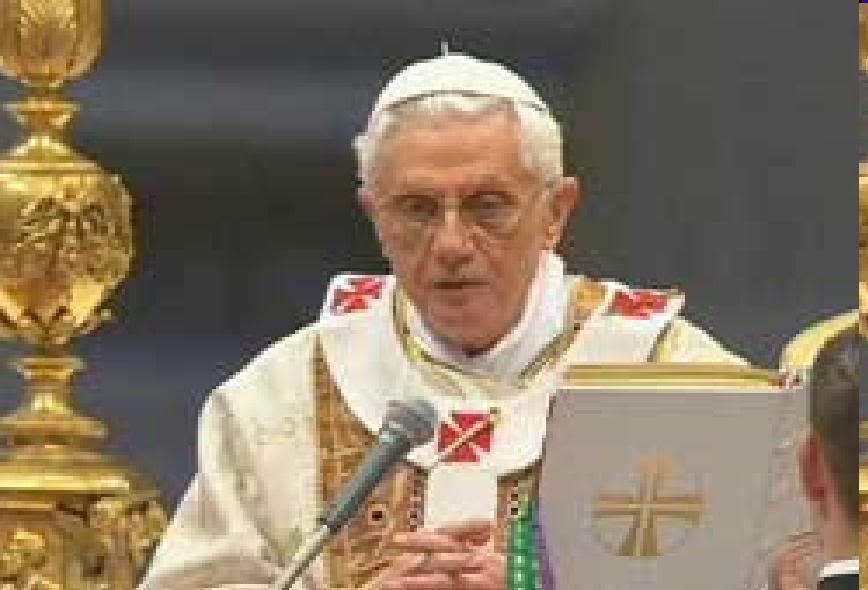
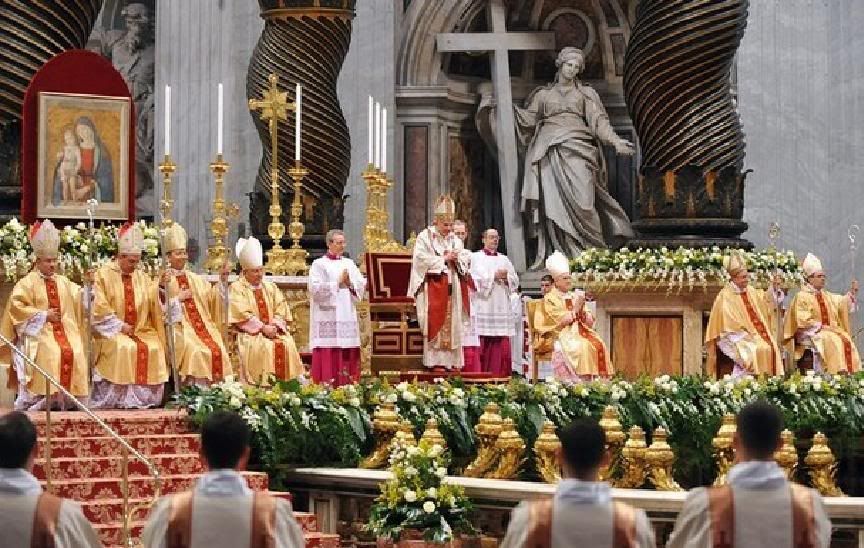
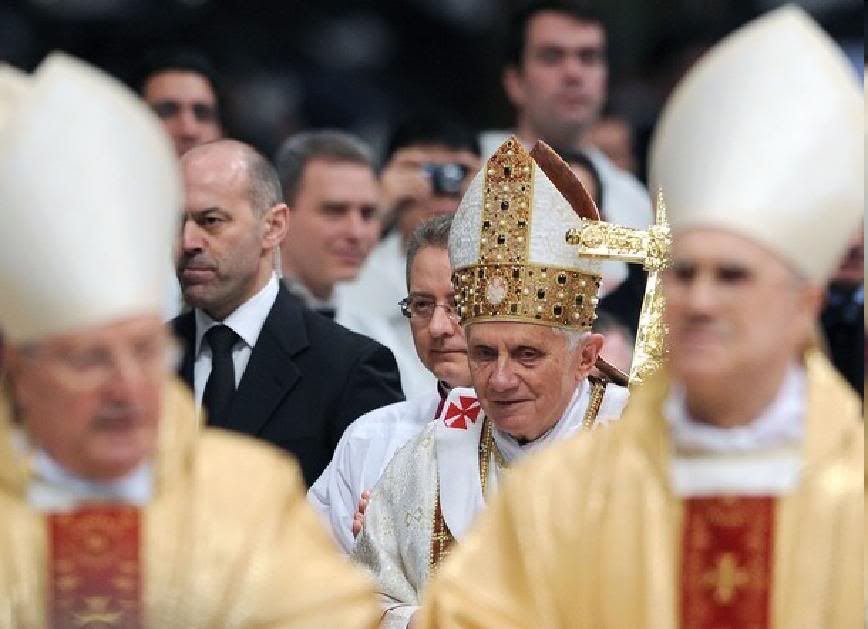
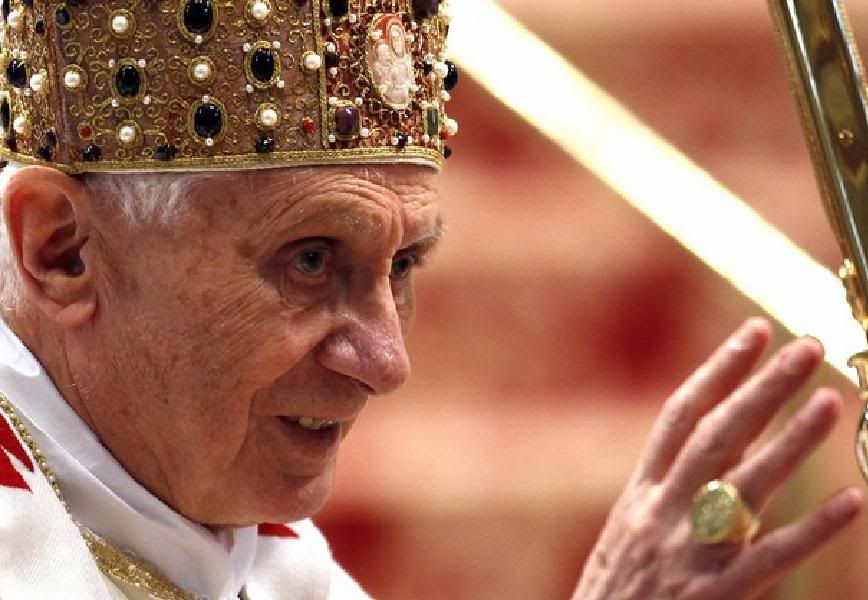
[Modificato da TERESA BENEDETTA 17/03/2011 15:28] |